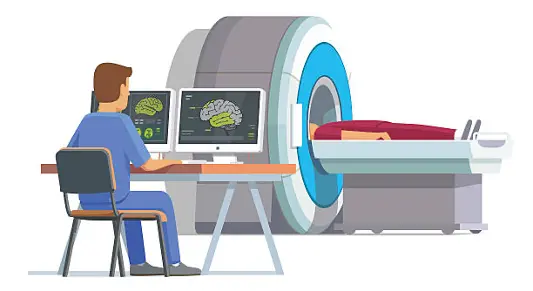In recent years, in order to understand individual variability in brain network organization, researchers have begun using a technique known as Precision Functional Mapping (PFM) . PFM entails collecting hours of resting-state fMRI data from a small number participants to reliably characterize brain network topography in each individual. Empirical work using this approach has shown that adults display stable, individual-specific features of brain network topography that deviate from group averages and may be related to cognition. However, I am extending this work by applying PFM to an adolescent population. With these data, I characterize the individual-specific network topography of the developing brain. My team has collected resting-state fMRI, task-based fMRI, and movie-watching fMRI data from 8 teenagers between the ages of 13 and 16. In addition, our participants completed ecological momentary assessment (EMA) and salivary hormone sampling, as well as wearing an Oura ring to capture physiological variability in sleep and body temperature. Analyses are underway, and we hope to share these data and our results soon!
About Me
I am a Cognitive and Affective Neuroscience PhD Student in the Department of Psychology at Northwestern University. I conduct my research training with Dr. Katie Insel in the Child & Adolescent Translational Science Lab . Here, I conduct research using brain imaging and behavioral data to study patterns of adolescents' executive function and cognitive control and how this may be related to the development of psychopathology during this critical time of brain maturation.
I spent three years following my undergraduate education as a post-baccalaureate fellow at the National Institute of Mental Health. I worked in the Section on Functional Imaging Methods under Dr. Peter Bandettini analyzing functional connectivity in resting-state fMRI and how to leverage connectivity information to enhance brain-behavior predictions. I also had the opportunity to work in the Clinical & Translational Neuroscience Branch under Dr. Karen Berman . There, I conducted research using brain imaging to investigate the relationship between gonadal hormone fluctuations and the brain at rest in healthy women, men, and women using oral contraceptives.


I received a B.A. in Psychology from Cornell University in 2021, where I found my love for neuroscience and coding. I worked as an undergraduate research assistant in the Laboratory of the Neurobiology of Learning and Memory under Dr. David Smith , studying the anterior nucleus of the hippocampus using opto-genetics and chemo-genetics.


Outside of the lab, I love a good brunch, reading, and watching sports with my family.
Research
I am interested in studying the adolescent brain and developmental trajectories of higher-order cognition. My work focuses on investigating how the hormonal changes that accompany adolescence and the pubertal transition influence the development of higher-order cognitive processes, such as decision making and cognitive control.
Previous research has established that adults often work harder and perform better when monetary rewards are at stake. However, less is known about how monetary rewards shape cognitive function during adolescence. My work looks at how monetary rewards influence performance on a working memory task in participants between the ages of 10 and 20. I am also completing cross-task analyses to investigate how the same participants perform in a cognitive flexibility task with an identical experimental design.
In Dr. Karen Berman's lab, I worked to better characterize the intricate link between the endocrine and nervous systems. To measure brain function, I used PET imaging to extract measures of resting regional cerebral blood flow (rCBF) as well as an MRI method known as Arterial Spin Labeling . Resting rCBF has been shown to exhibit robust sex differences, as well as abnormalities in several neuropsychiatric illnesses where in sex differences occur, such as major depression and schizophrenia. The goal of my project was to evaluate the effects of hormone condition on brain function using measures of rCBF extracted from PET resting scans of healthy subjects done at the NIH Clinical Center. Our subjects included men, naturally cycling women, and women using oral contraceptives.
During my time in Dr. Peter Bandettini's lab , I worked on a multitude of projects analyzing functional connectivity in resting-state fMRI and how to leverage connectivity information to enhance brain-behavior predictions. The goal of my first project was to investigate the source of individual variability in resting-state fMRI in healthy adults. We hypothesized that a potential source of variability during rest is 'ongoing cognition' that subjects engage in over the course of the scan (a, b). Ongoing cognition refers to everything from thinking about what to make for dinner to stressing about an upcoming meeting with your boss to daydreaming about a vacation and more. We used a publicly available dataset that consisted of multiple resting-state scans per subject as well as responses to a post-scan questionnaire that asked subjects to characterize their in-scanner experience. We found significant associations between distinct patterns of thought and functional connectivity patterns, highlighting the potential need to account for these effects when examining resting-state fMRI data.
Next, I sought to investigate how to leverage connectivity information to boost brain-behavior predictions. I employed a new technique to compute 'edge time series' from traditional ROI time series to capture the co-fluctuation between any given pair of nodes at each point in time across the whole scan. Then, to summarize these co-fluctuations overtime, we computed multiple summary metrics, including time-insensitive metrics, such as mean, and time-sensitive metrics, such as autocorrelation and dynamic entropy, to form new ROIxROI matrices for each subject and evaluated their predictive ability. We found that mean co-fluctuation, i.e. static functional connectivity, proves to be the best predictor of cognitive traits using this dataset , so far!
Poster Presentations
Social & Affective Neuroscience Society Annual Meeting
Investigating Age-Related Flexibility in Cognitive Effort Allocation
View PosterFlux Society for Developmental Cognitive Neuroscience Annual Meeting
Children and Younger Adolescents Show Greater Reward-Boosted Working Memory Performance than Older Adolescents and Adults
View PosterNational Institutes of Health Postbaccalaureate Poster Days
Resting Regional Cerebral Blood Flow Across Men, Naturally-Cycling Women, and Women using Oral Contraceptives Measured by [15O]-Water Positron Emission Tomography
View PosterSociety of Biological Psychiatry Annual Meeting
[15O]-Water PET Regional Cerebral Blood Flow during Rest in Men, Naturally-Cycling Women, and Women using Oral Contraceptives
View PosterNational Institutes of Health Postbaccalaureate Poster Days
Building brain-behavior predictions from multiple measures of fMRI connectivity dynamics
View PosterOrganization for Human Brain Mapping Annual Meeting
Edge-time series summary metrics: predictive value for demographics and cognitive traits
View PosterNational Institute of Mental Health Training Day
Exploring the landscape of brain-behavior predictions by leveraging dynamic connectivity information from resting-state fMRI
View PosterSociety for Neuroscience Annual Meeting
Evaluating the predictive power of dynamic fMRI connectivity summary statistics
View PosterNational Institutes of Health Postbaccalaureate Poster Days
Content and Form of Conscious Thoughts Modulate Functional Connectivity
View PosterOrganization for Human Brain Mapping Annual Meeting
How conscious thoughts during "resting-state" affect functional connectivity estimates
National Institute of Mental Health Training Day
Functional Connectivity Modulated by Conscious Thoughts During Resting-State fMRI
View PosterSociety for Neuroscience Annual Meeting
How conscious in-scanner thoughts modulate functional connectivity during resting-state
View PosterChildren's National Research Institute Education and Innovation Week
Examining the Relationship Between Child Race, Income and Caregiver Psychosocial Functional in Families of Young Children with Diabetes
Publications
In-Scanner Thoughts Shape Resting-state Functional Connectivity: how participants rest matters
Nature Communications
The art and science of using quality control to understand and improve fMRI data
Frontiers in Neuroscience, Vol. 17
This paper describes the authors' approach on how to best quality control fMRI data.